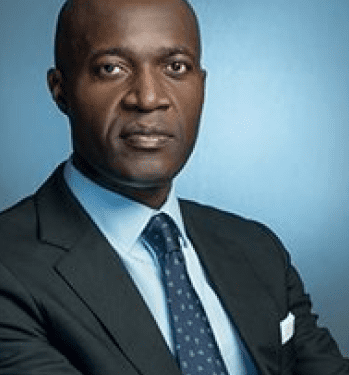Financial services in Nigeria are highly competitive, especially with the advent of over 100 financial institutions, who are all vying for the top spot. As for Access Bank, it is making the most of the incredible environment it has built, not resting on its laurels.
Led by Rooselvelt Ogbonna, Access bank has been on the forefront in the Nation’s banking industry. Ogbonna was appointed as the Bank’s Managing Director/ Chief Executive Officer effective May 2022.
Prior to this, Ogbonna was appointed as the Bank’s Deputy Managing Director in 2017 and Executive Director in 2013. He is a through-bred and consummate professional with over two (2) decades of banking experience having joined Access Bank in 2002 from Guaranty Trust Bank.
Ogbonna has a very rich professional cum academic background. He is a Fellow of the Institute of Chartered Accountants of Nigeria (FCA), an Honorary Member of the Chartered Institute of Bankers (HCIB), a graduate of the Harvard Kennedy School of Government’s Senior Executive Fellow programme, an alumnus of Harvard Business School and a CFA charter holder. He holds a Master’s degree in Business Administration from IMD Business School, Switzerland; a Master’s degree (LL.M) in International Corporate & Commercial Law from King’s College, London; an Executive Master’s degree in Business Administration from Cheung Kong Graduate School of Business; and a Bachelor’s degree in Banking and Finance from University of Nigeria, Nsukka. In 2015, he was selected as one of the Institute of International Finance (IIF) Future Global Leaders. Roosevelt has attended Executive Management Development Programmes on diverse areas of banking and management in world leading institutions.
By this month, March 2023, Access Bank under Ogbonna’s leadership, will be marking twenty-one years as a financial institution in Nigeria. Established by two young Nigerian bankers – Aigboje Aig-Imoukhuede and Herbert Wigwe, who bought a small, nondescript bank, they turned it into one of the biggest lenders in the country with subsidiaries across Africa, Europe and Asia.
Information has it that, March 22, 2002, the two innovative Bankers assumed duty and took full control as the managing director and deputy managing director of Access Bank. The acquisition process had taken about two years and entailed rigorous negotiations, sleepless hours of paper work and long meetings. It was one of the most audacious takeovers in the history of the nation’s financial industry.
However, Access Bank’s growth has been phenomenal in the last two decades, while its inspiring success story has been able to groom younger generations of innovators.
The bank is already putting a stake in the ground and saying its next stop is the modernisation of its networking environment.
The financial institution was also the leading bank in West Africa with respect to its capital. Access Bank and Guaranty Trust Bank followed, with their tier 1 capital amounting to around 2.2 billion U.S. dollars and 2.1 billion U.S. dollars. Compared to its contemporaries, Access Bank PLC scored higher in 9 areas: Overall Rating, Culture & Values, Diversity & Inclusion, Work-life balance, Senior Management, Compensation & Benefits, Career Opportunities, Recommend to a friend and Positive Business Outlook.
Listed on the Nigerian Stock Exchange, Access Bank PLC. is a leading full-service commercial bank operating a network of more than 600 branches and service outlets. It has 3,000 ATMs, over 28,000 employees and services 45 million customers.
According to information at our disposal, with acquisition strategy, Access Bank Plc accounts for 19% of Nigerian Banking system assets, according to a Fitch Ratings note. In the latest rating, the global rating agency affirmed the bank’s Long-Term Issuer Default Rating (IDR) at ‘B’ with a stable outlook.
Access Bank’s Viability Rating (VR) is also affirmed at ‘b’ and National Long-Term Rating at ‘A+ (nga)’, indicating a strong credit profile with no support from the sovereign in case of material risks.
The rating note indicated that Access Bank’s Long-Term IDR is driven by its standalone creditworthiness, while the bank’s VR was supported by healthy loan quality and strong revenue diversification, profitability and liquidity coverage.
Fitch explained further that the Group VR also reflects the constraint of a challenging operating environment, aggressive cross-border growth and moderate capitalisation in the context of its risk profile.
Access Bank’s National Long-Term Rating balances its leading franchise and strong financial profile against weaker capitalization than higher-rated peers, noting that the downside to operating conditions of the bank includes rising global risks which are projected to weaken domestic operating conditions.
Pressure on the consumer price level is noted to be a downside risk, with the inflation rate rising to 17.71% in May from 16.8% in April 2022. This is expected to remain stubbornly high, posing downside risks to real GDP growth forecasts of 3.1% in 2022 and 3.3% in 2023.
With all of this in place, the bank is now officially the top-ranked bank in Nigeria, leapfrogging 64 places to get to this point. It says it will maintain a position by being a technology-savvy and digital-centric organisation.
Access Bank delivers strong profitability, as indicated by operating returns on risk-weighted assets that have averaged 3.5% over the past four years. Strong profitability is supported by a wide net interest margin (NIM), strong non-interest income and moderate loan impairment charges. Profitability has improved moderately in recent years as a result of greater cost efficiency and increased non-interest income.
Access Bank is considered moderately capitalised, according to the rating note, with a Fitch Core Capital ratio of 14.8% at the end of Q1 2022, lower than most Nigerian D-SIBs’, reflecting higher balance-sheet leverage. Pre-impairment operating profit is healthy, providing a sizable buffer to absorb loan impairment charges without affecting the group capital.
Group regulatory capital ratios have healthy buffers above impending Basel III requirements but Fitch expects the bank’s unconsolidated common equity capital (CET1) capital ratio to have a tight buffer over the 13% minimum requirement.
Olamide Adeniji is a member of the editorial team of TheScript Newspaper




